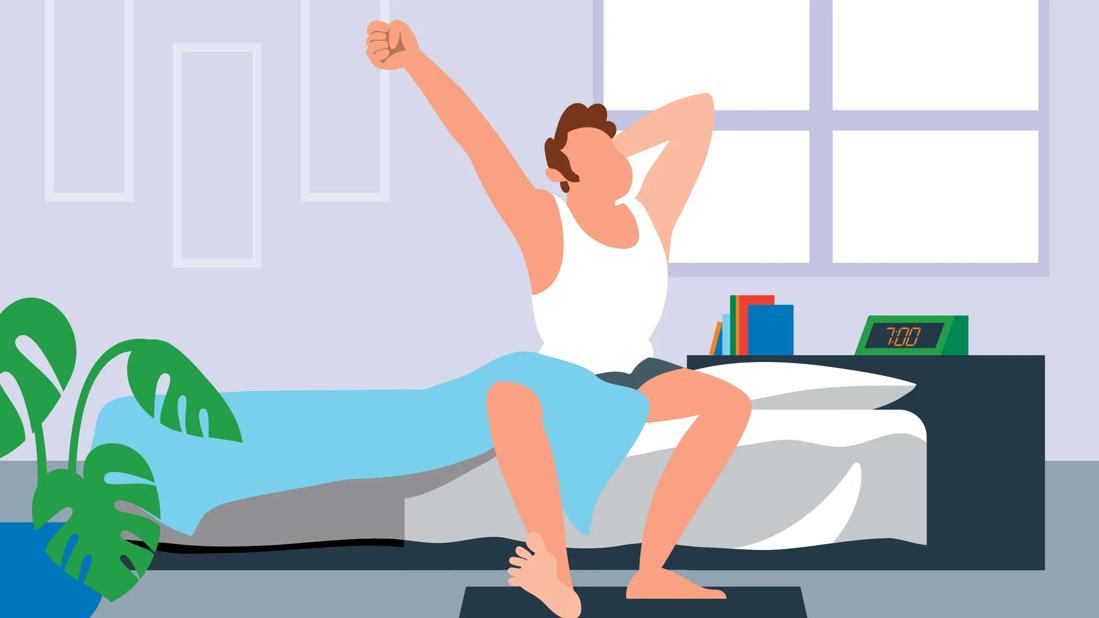‘Morning wood’ is a natural bodily function and a sign of sexual health

When guys wake up in the morning, a certain body part also tends to rise. Medically, this phenomenon is known as nocturnal penile tumescence. But it may be better known by the name “morning wood.”
Advertisement
Cleveland Clinic is a non-profit academic medical center. Advertising on our site helps support our mission. We do not endorse non-Cleveland Clinic products or services. Policy
So, why does an alarm clock going off seem to trigger an erection? (Getting up and out of bed really isn’t that alluring after all.)
We asked urologists Ryan Berglund, MD, and Raevti Bole, MD, to explain.
“Morning wood” is the descriptive name given to an erect penis that stands tall in the moments after boys and men awaken after a night of sleep. The moniker, however, is only partly accurate.
“A penis may become erect and then flaccid several times in the course of a night,” says Dr. Berglund. “It’s not just in the morning. You’re simply more likely to notice it happening when you wake up.”
Your body doesn’t completely shut down while you sleep. Essential operations — like your heartbeat and breathing — continue under management from your parasympathetic nervous system (PSNS).
Know what else your PSNS controls? Sexual arousal, including erections in men.
PSNS activity while you catch ZZZs may generate genital activity, particularly during the dreamy stage of REM sleep, notes Dr. Berglund and Dr. Bole. An erotic dream can result in an erection and maybe even ejaculation (or what’s known as a “wet dream”).
Other potential causes of overnight or morning erections include:
Advertisement
It should be noted that girls and women can experience a similar form of genital stimulation as they sleep. It’s known as nocturnal clitoral tumescence, or “morning bean,” and can lead to swelling of the clitoris and vaginal lubrication.
A morning erection can occur at any age. Even male fetuses have erections in utero!
“It’s very common for friends of mine who are parents to call and ask if it’s a problem that their 3-year-old has an erection,” shares Dr. Berglund. “The answer I always give them is that it’s totally normal.”
But the regularity and stiffness of morning erections may decrease with age.
Waking up without morning wood on occasion isn’t a reason to be overly concerned. But if there never seems to be any lumber down low, it could be a sign of a health issue that deserves attention.
“Nighttime and morning erections are linked to sexual health,” says Dr. Bole. “If they’re really not happening, it could be an early indicator of erectile dysfunction or dysregulated hormones.”
The lack of regular morning erections may also be a sign of sleep disorders or stress.
Talk to your healthcare provider if you notice that you’re rarely experiencing morning erections.
“Err on the side of mentioning it, especially if you’re noticing a trend,” advises Dr. Bole. “They might run tests and find you’re healthy as a horse. But there’s also a chance that they could uncover something that needs attention. There’s a good risk-benefit in checking it out.”
Advertisement

Sign up for our Health Essentials emails for expert guidance on nutrition, fitness, sleep, skin care and more.
Learn more about our editorial process.
Advertisement

A variety of factors can cause temporary or more lasting changes in penis length

Changes in penis performance or appearance may signal heart issues, diabetes and more

Find out about the wide range of “normal penises.”

An unexplained lump, swelling, discomfort or changes to your testicles shouldn’t be ignored

Arousal without orgasm can be uncomfortable, but it’s no reason to pressure sexual interactions

The list includes eating a healthier diet, managing your weight and reducing stress

Adjusting your diet to focus on plant-based, whole foods may improve erectile function

Here’s what you need to know about ED, which most men experience to some degree during their lives

Even small moments of time outdoors can help reduce stress, boost mood and restore a sense of calm

A correct prescription helps your eyes see clearly — but as natural changes occur, you may need stronger or different eyeglasses

Both are medical emergencies, but they are very distinct events with different causes